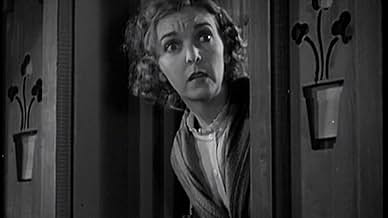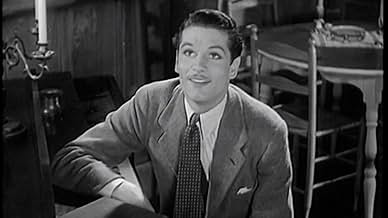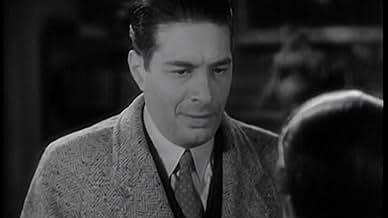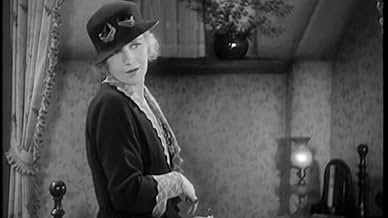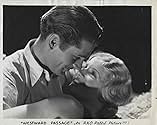Adicionar um enredo no seu idiomaA struggling writer divorces his wife to pursue his career without interference, but they meet in Europe years later after she has remarried.A struggling writer divorces his wife to pursue his career without interference, but they meet in Europe years later after she has remarried.A struggling writer divorces his wife to pursue his career without interference, but they meet in Europe years later after she has remarried.
- Direção
- Roteiristas
- Artistas
Lita Chevret
- Party Guest
- (não creditado)
Joyce Compton
- Lillie
- (não creditado)
Julie Haydon
- Bridesmaid
- (não creditado)
Carl M. Leviness
- Ship Passenger
- (não creditado)
- Direção
- Roteiristas
- Elenco e equipe completos
- Produção, bilheteria e muito mais no IMDbPro
Avaliações em destaque
In the Citadel Film series book on the Films Of Laurence Olivier, Lord Olivier was not crazy about any of his movies before Wuthering Heights. But as to this film Westward Passage he was grateful to his co-star Ann Harding for being generous to a newcomer from across the pond. Maybe Ann wanted to make sure the blame went all around for this film.
Olivier came over the USA for the first time when RKO signed his then wife Jill Esmond and they found work for him as well. In this film he plays one massively egotistical struggling novelist whom you will positively hate as you see the film. He marries Ann Harding and they have a daughter who grows up in 10 years to be Bonita Granville.
Olivier embarks on a campaign to win his wife back who is now married to the earnest, but stodgy and rich Irving Pichel after Olivier literally threw her into his arms. This is after 10 years and Olivier is now a big success.
Quite frankly I found Olivier in this film to be one egotistical jerk and can't imagine why Harding isn't well glad to be rid of him. Of course I'd provide for visitation for Granville, but that's it.
Some good comedy relief is provided by Zasu Pitts playing an innkeeper. But this film is a romantic comedy that completely misfires.
Olivier came over the USA for the first time when RKO signed his then wife Jill Esmond and they found work for him as well. In this film he plays one massively egotistical struggling novelist whom you will positively hate as you see the film. He marries Ann Harding and they have a daughter who grows up in 10 years to be Bonita Granville.
Olivier embarks on a campaign to win his wife back who is now married to the earnest, but stodgy and rich Irving Pichel after Olivier literally threw her into his arms. This is after 10 years and Olivier is now a big success.
Quite frankly I found Olivier in this film to be one egotistical jerk and can't imagine why Harding isn't well glad to be rid of him. Of course I'd provide for visitation for Granville, but that's it.
Some good comedy relief is provided by Zasu Pitts playing an innkeeper. But this film is a romantic comedy that completely misfires.
No one can deny that Ann Harding was something to look at, and that is about all this film has to offer. Her co-star is a very young mustachioed Laurence Olivier working very hard to make something of an unconvincingly written character -specifically, a high-strung novelist who resents churning out hack material for quick money to pay the bills while living in a small apartment with his wife (Harding) and a baby daughter. Eventually he can take no more, divorces his wife and goes off to write what he pleases in peace, leaving his wife to marry a long-time admirer (Irving Pichel) who provides her with money and status even though she is not in love with him. Years later the estranged couple meets again in Lucerne. By now he is a successful and famous novelist and impulsively decides to wrest back the woman he had deserted. Throughout the proceedings they bicker and make up with tiring frequency. The movie is mostly talk in the Noel Coward style but without the Coward sparkle. The fights and reconciliations, including the reuniting of a divorced couple at a classy resort, are very reminiscent of Coward's "Private Lives" which had been filmed with disastrous results the year before. As in "Lives," the couple even plays and sings a song from time to time, in this case "What'll I Do?" In short, this is good if you like watching Harding, a great screen beauty, and examining the meticulous craftsmanship of Olivier. Otherwise it's a leaden and witless talkathon.
Studios must have known the value of naming a film correctly, but in the case of Pathe, they called this one Westward Passage, which sounds like a bunch of people on a wagon train.
Actually it's a film about a modern (1932) young married couple, played by Ann Harding and Laurence Olivier.
I thought this might be a play for a couple of reasons. First is the amount of dialogue and secondly, it was third class Noel Coward and probably trying to cash in on Private Lives.
The story concerns a writer, Nicholas (Olivier) who marries Olivia (Ann Harding). It seems as if five minutes after the honeymoon, the two start quarreling on a hourly basis.
They live in a small apartment; Nicholas' publisher is demanding that he change the end of his novel, and he's refusing and loses his temper; and then she hits him up with the fact that she's pregnant, which he wasn't planning on.
Eventually, they divorce. Olivia marries Harry, who adores her and has money, though she's not in love with him. Hers and Nicholas' little girl (Bonita Granville) accompanies her.
A few years later, in Lucerne, Olivia happens by a bookstore selling Nicholas' book, and Nicholas, exiting, hands her a copy. He's now successful and decides he wants her back. He even takes passage (get it? westward passage) on a ship she's traveling on without her husband.
This isn't very good. Olivier, wearing odd eye makeup, hadn't learned acting before the cameras yet, so he's over the top. He wouldn't learn it until Wuthering Heights when, before the cast, he said, "I suppose this anemic little medium can't take great acting," which sent director William Wyler, the cast, and crew into spasms of laughter.
He's high energy, probably trying to cover up for the fact that his part isn't well written. A friend of mine used to take a line from Rebecca, "I hated her," and imitate Olivier, going into falsetto on "hated." Ever since then, I've noticed when Olivier gets excited, his voice goes up an octave at least in his youth.
Ann Harding is lovely. Unfortunately the film is beneath both of them. Olivier was destined to become one of the greatest actors in both theater and film, not to mention one of the most glorious looking. The elegant Harding eventually moved into character roles, working into the 1960s.
These actors are always worth seeing, provided you can make it through this somewhat boring movie.
Actually it's a film about a modern (1932) young married couple, played by Ann Harding and Laurence Olivier.
I thought this might be a play for a couple of reasons. First is the amount of dialogue and secondly, it was third class Noel Coward and probably trying to cash in on Private Lives.
The story concerns a writer, Nicholas (Olivier) who marries Olivia (Ann Harding). It seems as if five minutes after the honeymoon, the two start quarreling on a hourly basis.
They live in a small apartment; Nicholas' publisher is demanding that he change the end of his novel, and he's refusing and loses his temper; and then she hits him up with the fact that she's pregnant, which he wasn't planning on.
Eventually, they divorce. Olivia marries Harry, who adores her and has money, though she's not in love with him. Hers and Nicholas' little girl (Bonita Granville) accompanies her.
A few years later, in Lucerne, Olivia happens by a bookstore selling Nicholas' book, and Nicholas, exiting, hands her a copy. He's now successful and decides he wants her back. He even takes passage (get it? westward passage) on a ship she's traveling on without her husband.
This isn't very good. Olivier, wearing odd eye makeup, hadn't learned acting before the cameras yet, so he's over the top. He wouldn't learn it until Wuthering Heights when, before the cast, he said, "I suppose this anemic little medium can't take great acting," which sent director William Wyler, the cast, and crew into spasms of laughter.
He's high energy, probably trying to cover up for the fact that his part isn't well written. A friend of mine used to take a line from Rebecca, "I hated her," and imitate Olivier, going into falsetto on "hated." Ever since then, I've noticed when Olivier gets excited, his voice goes up an octave at least in his youth.
Ann Harding is lovely. Unfortunately the film is beneath both of them. Olivier was destined to become one of the greatest actors in both theater and film, not to mention one of the most glorious looking. The elegant Harding eventually moved into character roles, working into the 1960s.
These actors are always worth seeing, provided you can make it through this somewhat boring movie.
This "drama" comes across more as a comedy of manners since a) most of the story concerns the romance between two characters and b) I believe the intent was to focus on the dialogue, especially between those two characters. Released in 1932, "Westward Passage" came not long after the advent of talkies, and I think studios were still learning about the capabilities of scripts not limited by title cards.
Since this film is only 73 minutes in length, the transition between scenes and the passage of time are rather choppy, short-changing what might have been a more interesting story if it were developed more.
The primary characters are Olivia Allen (Ann Harding) and Nick Allen (Laurence Olivier), who we first meet as giggly newlyweds arriving at the inn of Mrs. Truesdale (Zasu Pitts).
Suddenly the newlyweds are dullyweds, living in a cramped flat, dealing with the realities of life. Nick, a writer, feels inhibited by his lifestyle and harangued by his editor, who wants him to add a happy ending to his manuscript. What does this portend for our lovebirds, we might wonder? Suddenly, baby makes three and Nick is thrust into the tedious responsibilities of fatherhood. Ill feelings ensue.
The center of the conflict is Nick's preoccupation with the idea that an artist must live a solitary life to create real art, unhampered by the quotidian aspects of life. At the same time, the Allens love each other. It seems love and art are incompatible.
Nick loses Olivia, then tries to woo her back, quoting "Paradise Lost" and singing "What'll I do". Olivia displays a resolution to always be proper, but her love for Nick--that literary bad boy--is undeniable and, like love sometimes is, unfathomable.
If you are wondering "What'll they do?" and "will paradise be regained?" you will have to watch this film that is very representative of its time, even if it could be much smoother. The dialogue contains some clever lines, but not enough to earn this film high marks.
Since this film is only 73 minutes in length, the transition between scenes and the passage of time are rather choppy, short-changing what might have been a more interesting story if it were developed more.
The primary characters are Olivia Allen (Ann Harding) and Nick Allen (Laurence Olivier), who we first meet as giggly newlyweds arriving at the inn of Mrs. Truesdale (Zasu Pitts).
Suddenly the newlyweds are dullyweds, living in a cramped flat, dealing with the realities of life. Nick, a writer, feels inhibited by his lifestyle and harangued by his editor, who wants him to add a happy ending to his manuscript. What does this portend for our lovebirds, we might wonder? Suddenly, baby makes three and Nick is thrust into the tedious responsibilities of fatherhood. Ill feelings ensue.
The center of the conflict is Nick's preoccupation with the idea that an artist must live a solitary life to create real art, unhampered by the quotidian aspects of life. At the same time, the Allens love each other. It seems love and art are incompatible.
Nick loses Olivia, then tries to woo her back, quoting "Paradise Lost" and singing "What'll I do". Olivia displays a resolution to always be proper, but her love for Nick--that literary bad boy--is undeniable and, like love sometimes is, unfathomable.
If you are wondering "What'll they do?" and "will paradise be regained?" you will have to watch this film that is very representative of its time, even if it could be much smoother. The dialogue contains some clever lines, but not enough to earn this film high marks.
Very odd story about love and marriage and responsibility that does features some good acting by Ann Harding, Laurence Olivier, Zasu Pitts, Irving Pichel, Irene Purcell, and Juliette Compton, but the characters don't seem to be very bright.
I assume this was a very "smart" stage play but it just doesn't wash on screen. Harding, a big star in the early 30s, usually plays very smart, very classy women but here she's rather a dope. Olivier plays a selfish fool who keeps trying to be charming, and is! Ultimately the total unreality of the central characters overwashes the best of intentions and good acting. The divorce is not very believable, but the re-marriage is absurd.
Also co-stars Bonita Granville, Herman Bing, Ethel Griffies, Florence Roberts, Florence Lake, Edgar Kennedy, and Don Alvarado.
I assume this was a very "smart" stage play but it just doesn't wash on screen. Harding, a big star in the early 30s, usually plays very smart, very classy women but here she's rather a dope. Olivier plays a selfish fool who keeps trying to be charming, and is! Ultimately the total unreality of the central characters overwashes the best of intentions and good acting. The divorce is not very believable, but the re-marriage is absurd.
Also co-stars Bonita Granville, Herman Bing, Ethel Griffies, Florence Roberts, Florence Lake, Edgar Kennedy, and Don Alvarado.
Você sabia?
- CuriosidadesTheatrical movie debut of Bonita Granville (Little Olivia Allen (age 10)).
- Erros de gravaçãoNick's telegram congratulating Olivia and Harry on their marriage is dated May 10 1928. Later scenes are supposed to take place six years later, despite the film having been released in 1932.
- ConexõesReferenced in The Complete Citizen Kane (1991)
- Trilhas sonorasThe Wedding March
(uncredited)
from "A Midsummer Night's Dream"
Music by Felix Mendelssohn
Played by Laurence Olivier on the piano
Principais escolhas
Faça login para avaliar e ver a lista de recomendações personalizadas
Detalhes
- Data de lançamento
- País de origem
- Idiomas
- Também conhecido como
- Sacrificio de amor
- Locações de filme
- Empresa de produção
- Consulte mais créditos da empresa na IMDbPro
- Tempo de duração1 hora 13 minutos
- Cor
- Proporção
- 1.37 : 1
Contribua para esta página
Sugerir uma alteração ou adicionar conteúdo ausente

Principal brecha
By what name was Westward Passage (1932) officially released in India in English?
Responda
